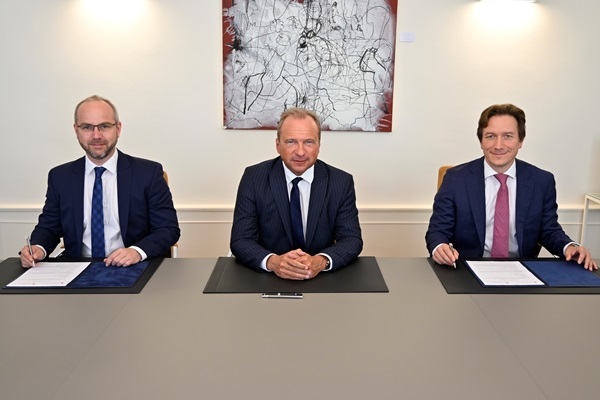 (L-R) Christian Buttel, Deputy Director of the Registration Duties, Estates and VAT Authority (AED); Gilles Roth, Luxembourg's Minister of Finance; Jean-Paul Olinger, Director of the Luxembourg Inland Revenue Administration (ACD);
Credit: MFIN
(L-R) Christian Buttel, Deputy Director of the Registration Duties, Estates and VAT Authority (AED); Gilles Roth, Luxembourg's Minister of Finance; Jean-Paul Olinger, Director of the Luxembourg Inland Revenue Administration (ACD);
Credit: MFIN
Luxembourg’s Ministry of Finance has announced that the Luxembourg Inland Revenue (Administration des contributions directes - ACD) and the Registration Duties, Estates and VAT Authority (Administration de l'enregistrement, des domaines et de la TVA - AED) will strengthen their collaboration from Monday 24 June 2024.
On Monday, Christian Buttel, Deputy Director of the AED and Jean-Paul Olinger, Director of the ACD, co-signed a memo containing instructions for the implementation of the law of 19 December 2008 on inter-administrative and judicial cooperation and the strengthening of the resources of tax administrations, in the presence of Luxembourg's Minister of Finance, Gilles Roth.
"The ever-closer cooperation between the two tax administrations constitutes an important new step in our joint fight against tax fraud. Compliance with tax rules will be better honoured. And our administrations will become even more efficient in compliance with data protection," declared Minister Roth.
"This is a very clear step forward compared to our current framework of cooperation", stressed Romain Heinen, Director of the AED. "Our cooperation is a win-win situation for both our administrations", added Jean-Paul Olinger.
The central points of this closer cooperation against tax fraud are as follows:
- improving exchanges between tax offices: the actors in the exchange at the level of the tax offices are no longer exclusively the agents or the collectors, but also their deputies;
- mandatory spontaneous exchange beyond certain thresholds: spontaneous exchange is mandatory beyond certain recovery thresholds (turnover and deductible expenses); thresholds will change, if necessary, depending on the practice;
- spontaneous exchange of information relating to refunds: information relating to refunds is now included in the spontaneous exchange by computer to allow the other administration to issue a summons to a third-party holder;
- simultaneous controls in cooperation with the tax offices: simultaneous controls continue to be coordinated centrally; however, the tax offices will now be able to participate in simultaneous controls, beyond the Revision Service (ACD) and the Anti-Fraud Service (AED) as currently;
- regular evaluation of cooperation: the two directorates regularly evaluate the results of the cooperation; this "feedback" makes it possible to improve cooperation gradually.








